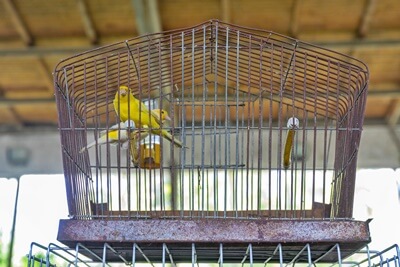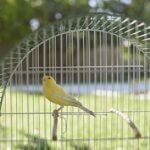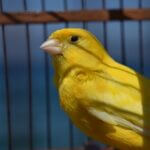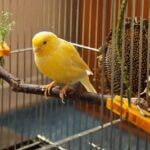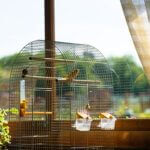Last Updated on: 27th February 2024, 12:12 pm
Canaries are susceptible to worms, which can attack their digestive tract and cause health issues like diarrhea, weight loss, and low appetite.
You can treat worms in canaries with anthelmintics, like albendazole, praziquantel, or fenbendazole.
If the canary lives in an outdoor aviary, deworm it once every 3 months. However, if the canary spends most of its time in an indoor cage, you can deworm it once every 6 months.
You can use various commercial and natural remedies to get rid of worms in canaries. However, you must recognize the symptoms of a worm infestation.
Can Canaries Get Worms?
The Journal of Parasitic Diseases attributes canaries’ susceptibility to worms to poor hygiene conditions in their living environments.
Usually, canaries get infected by worms from consuming contaminated food or water.
Although canaries kept outdoors are more susceptible to worms, canaries kept in indoor cages can contract worms if their cages and feeders aren’t cleaned and disinfected regularly.
Worms lodge themselves inside the canaries’ digestive systems. The worms meet their nutritional needs by feeding on the same food in the canary’s gut.
This can deprive the canary of nutrition, thus leading to rapid weight loss. Intestinal worms can also cause gastrointestinal obstruction and infections.
The most common worms that affect canaries include:
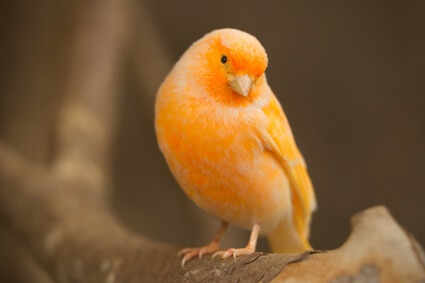
Ascarids
Ascarids are roundworms found in several species of birds, including parrots, finches, pigeons, and canaries. According to the Brazilian Journal of Veterinary Parasitology, the most prevalent types of roundworms in birds are:
- Capillarinae.
- Trichostrongylidae.
- Coccids.
Roundworms usually produce strong-shelled eggs that can survive in nearly any environment for several months. When canaries ingest the eggs, they hatch into larvae inside the intestines.
These larvae burrow into the intestinal lining and feed on the digested food inside the gut.
This will not only cause the affected canary to experience pain but can also lead to infection. After being ingested, a roundworm takes around 3 weeks to complete its life cycle.
Once fully developed, adults can produce eggs, which can be observed in the bird’s droppings.
Baby canaries that have recently fledged and are eating on the ground, whereas adult canaries that have passed worm eggs have a much higher risk of contracting roundworms.
Mature canaries have strong immune systems that can keep worm populations in check. However, young birds have low resistance and may become infected, causing intestinal obstruction.
Tapeworms
Tapeworms are flat, segmented worms that shed egg-containing segments called proglottids from their tail end to disperse their eggs.
Proglottids are large enough to be seen with the naked eye. However, identifying tapeworm eggs microscopically in canary droppings can be difficult unless the proglottid ruptures.
In most adult canaries, tapeworm infestations aren’t life-threatening and will only cause loose stools and mild infection.
However, for young fledglings with a much weaker immune system and sensitive gut, a tapeworm infestation can cause intestinal blockages and severe infections.
Gapeworms
Gapeworm is a parasite that causes respiratory illness in birds.
It primarily affects finches, canaries, magpies, and poultry in outdoor aviaries. This worm infects the tracheal wall (windpipe) and produces inflammation, causing respiratory difficulties in your bird. It may also cause death in advanced stages due to asphyxiation.
If your canary seems to be experiencing breathing difficulties, shaking its head, and gasping for air, it might be due to gapeworms.
Your vet will examine a sample of your canary’s feces under a high-power microscope to check for the presence of gapeworm eggs. They can also perform a worm count and determine the extent of the infestation based on the results of the excrement examination.
Gizzard Worms
Gizzard worms (amidostomum anseris) are 2-centimeter-long, thin worms that mainly afflict geese and chickens. However, they can also be found in canaries, finches, and budgies.
Infestations occur when birds ingest gizzard worm eggs in droppings. They’re more likely to happen when infected and healthy canaries are kept together.
Gizzard worms may cause harm to a canary’s intestines and death if not treated in time. They prevent food digestion in the intestines, resulting in weight loss and death by starvation.
Symptoms of Worms in Canaries
Early detection of worms is critical for successful treatment.
While the symptoms of worms in canaries may vary depending on the type of worm, the common symptoms that will alert you include the following:
- Diarrhea.
- Loss of appetite.
- Dark, sticky feces, which may contain blood.
- Breathing difficulties.
- Vomiting pneumonia.
- Intestinal obstruction.
- Lethargy.
- Depression.
- Drastic weight loss.
- Regurgitation of food.
- Coughing.
- Spasms.
- Head bobbing.
A vet will run tests on your canary and recommend an appropriate treatment regimen.
How To Worm Canaries
Canaries have sensitive digestive systems that can be severely affected by intestinal worms. As mentioned, worms survive in a canary’s gut by feeding on what it ingests.
Consequently, an untreated worm infestation can deprive a canary of the nutrition needed to stay healthy, which can cause your canary to lose weight and die of starvation.
You must deworm a canary every 3-6 months.
Below are some of the most common and effective ways you can deworm your canary:
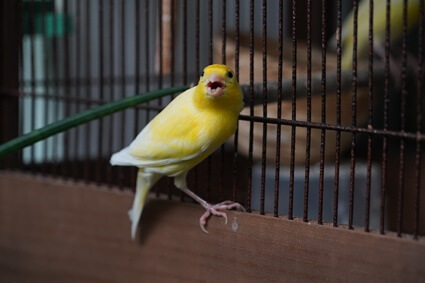
Anthelmintics
Deworming a canary using commercial anthelmintics is the safest and most effective way to eliminate intestinal worms.
Anthelmintics that are commonly used include the following:
- Albendazole.
- Praziquantel.
- Fenbendazole.
You can administer the liquid medication orally. Commercial anthelmintics stipulate the appropriate dosage and frequency of use.
Rotate the medications you use to treat worms to reduce the chances of the parasites developing resistance to one medication.
You’re advised to avoid deworming your canary during stressful periods, such as breeding and molting, which can put extra strain on its body.
Apple Cider Vinegar
Apple cider vinegar (ACV) has anti-parasitic properties. Mix one teaspoon of apple cider vinegar with a liter of water and pour the contents into the canary’s water bowl.
Garlic and Water
Garlic has anti-parasitic properties that can get rid of intestinal parasites. However, be cautious about the dosage since administering too much can irritate a canary’s digestive system.
Crush a clove of garlic and mix it with water. You’ll need to continue this treatment for at least 10 days to remove all the parasites inside the gut.
Change the garlic water every 2-3 days to prevent it from becoming contaminated.
Pumpkin Seeds
To deworm a canary with pumpkin seeds, peel the outer layer of skin surrounding the seeds and grind them into little pieces to make them easy to swallow. Then, put the crushed seeds into the feeding bowl.
The regular deworming of canaries is essential. If you have an indoor canary, it should be wormed at least once every six months with anthelmintics.

